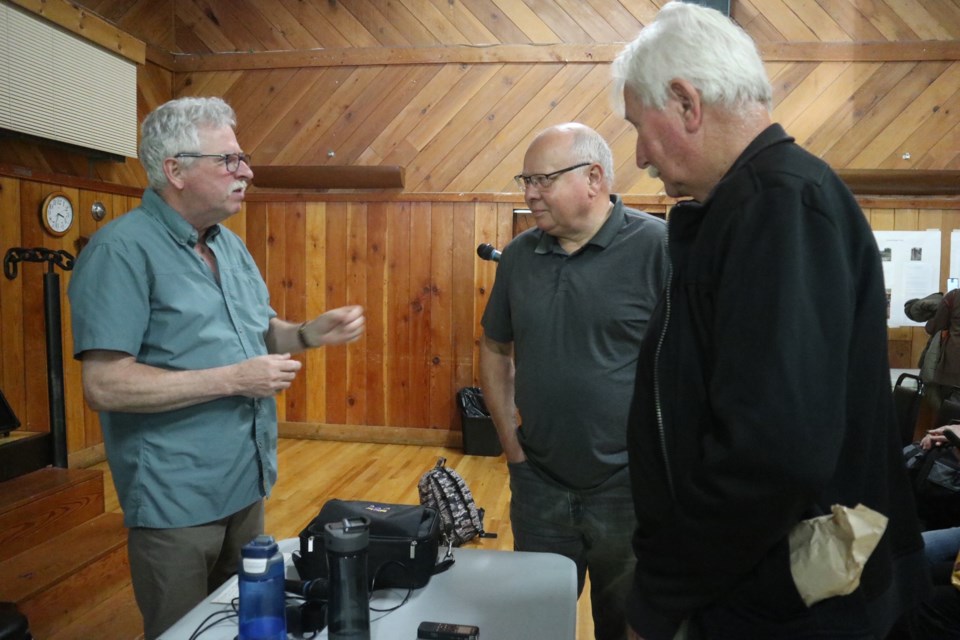A call for the Sunshine Coast Regional District (SCRD) to recognize its South Pender water system's supply is in “a crisis” was made at the Pender Harbour and Area Residents Association’s (PHARA) Town Hall meeting on Oct 22. It was supported with a round of applause at the group’s first in-person general gathering since the COVID-19 pandemic. The event filled the local community hall with more than 125 attendees on a warm, sunny afternoon that coincided with the Coast’s Art Crawl and a performance at the community’s School of Music. Attendees were kept engaged and in their seats for just over three hours.
Association president and meeting chairperson Peter Robson said PHARA would act on the request made by area resident Howard White to urge the regional district to give the area’s water supply issues priority in planning “starting immediately." Pender Harbour/Egmont SCRD area director Leonard Lee was in attendance to hear those comments as well as discussions on a range of other topics. He did not make a formal statement related to the water issue.
The water supply discussion followed a presentation on PHARA’s Madeira Park Community Well-Being Strategy project by recent University of British Columbia Community and Regional Planning master participant, Maggy Spence. That project saw her working in cooperation with the association as part of completing her program of studies. She noted that 450 individuals provided input during strategy development, which focused on building a vision, guiding values and an action plan to foster community well-being within Madeira Park. It recommended PHARA advocate for and consider action in the areas of affordable housing, alternative mobility options, social connectivity, as well as supporting a flourishing local economy and a strong sense of community ownership.
Stating that he was appreciative of the planning and project management work being done by PHARA, White remarked, “If you are going to plan for future expansion and growth in the community, the very first thing you need to look at are your basic services," such as water and road infrastructure.
Community Gardens future
A widespread show of hands affirmed that most at the meeting enjoyed and wanted to see the community gardens at the entrance to Madeira Park from Highway 101 and around the community hall maintained. Association director Bill Charlton led a discussion on how to do that once the community volunteer who has spearheaded that initiative steps back from those duties. In an exploration of the costs to contract for that service, he said PHARA requested contractor estimates. It received two bids, one for $60,000 a year to maintain the existing areas and one that covered existing and proposed additional areas that came in at $100,000. Given the interest shown, Charlton said the board would continue its efforts to look for options on providing and paying for that service.
Changes to provincial decision-making processes
Director Sean McAllister provided an update on PHARA's efforts related to the area’s Dock Management Plan, which have been ongoing since 2014. Expressing the view that there appeared to be “no rhyme or reason” in the way the management zones and other rules had been set, and that those may change moving forward, he said PHARA efforts to seek plan adjustments would continue. In the meantime, he encouraged dock owners to “play by the rules, if you can."
Speaking on a related issue, the proposed Section 7 Declaration on the Rights of Indigenous Peoples Act agreement between the province and shíshálh Nation, director Guy Halford-Thompson had words of caution for the audience.
“As far as we know, this agreement is a first, and the government is not good at firsts.”
He said the agreement could change and potentially set precedent for an undetermined range of BC government decisions. Those, he indicated, could be moved from the existing shared consideration process, where the government arrives at a conclusion after reviewing input from a variety of parties including First Nations, to a joint decision-making model. In that, each of the province and the involved First Nation has a decision veto, which could result in project and land use applications being stalled until the two decision-makers can agree, he stated. Noting that this could be “the tip of the iceberg for B.C.,” Halford-Thompson recommended attendees get “educated” on the impacts of both this issue and the dock management plan. He encouraged those with concerns to write to their Member of the Legislative Assembly on the subjects and to copy the association.
Discussions on other initiatives including a day-lighting plan for Lily (Pac) Lake Creek in the Madeira Park village area, an ocean clean-up project and area incorporation were also included at the event. More details on those matters are available on the PHARA website.



